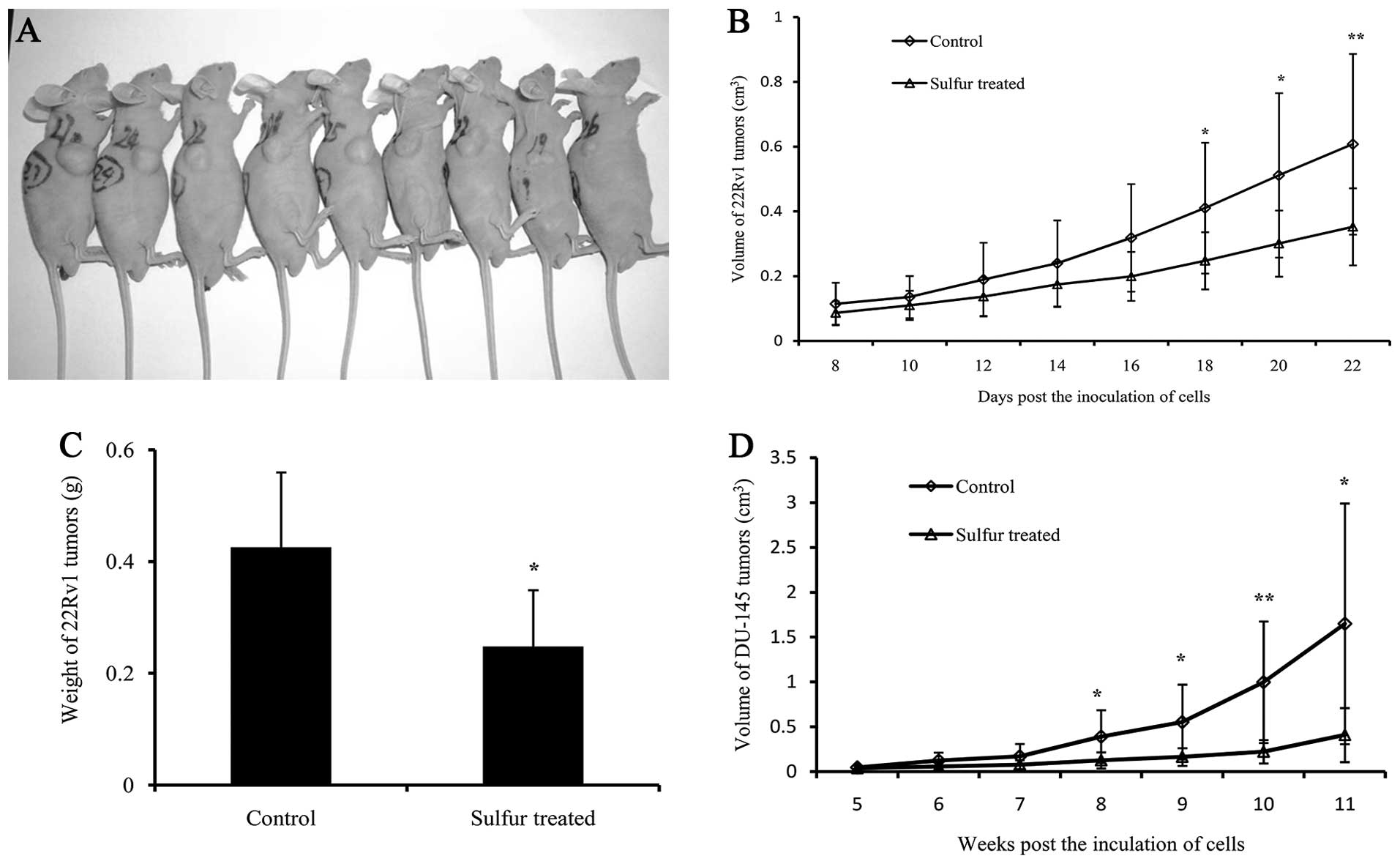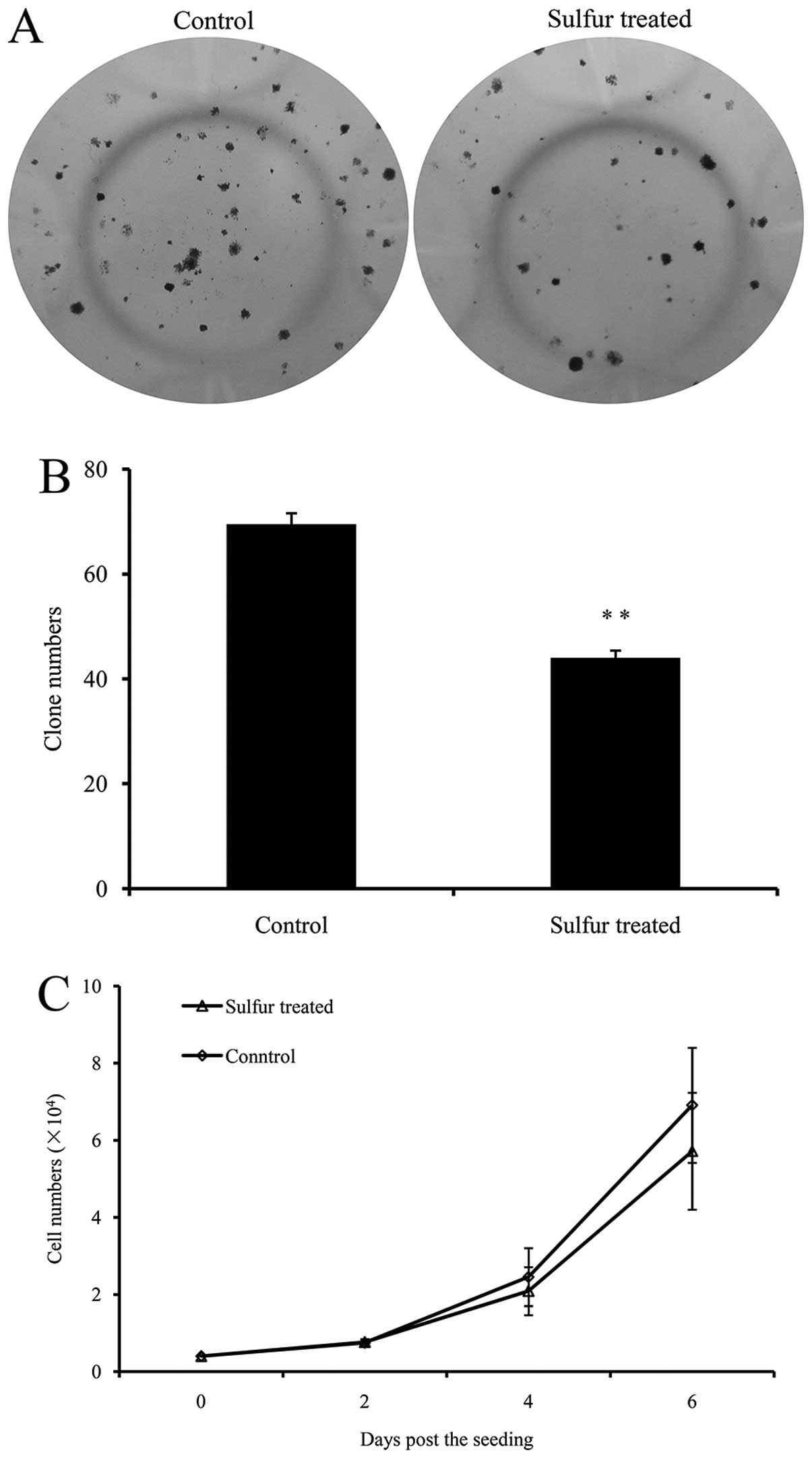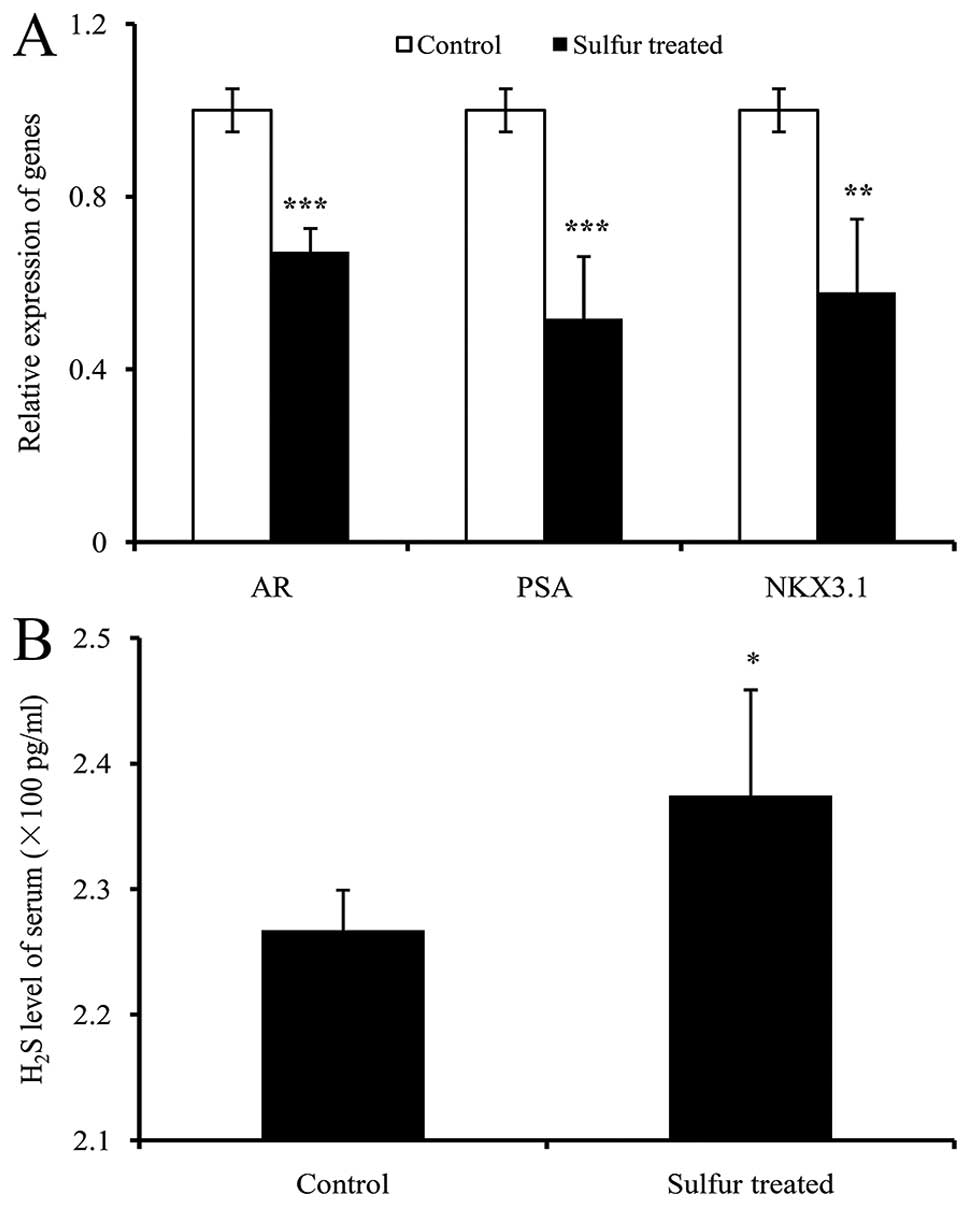|
1
|
Pruksachatkunakorn C, Damrongsak M and
Sinthupuan S: Sulfur for scabies outbreaks in orphanages. Pediatr
Dermatol. 19:448–453. 2002. View Article : Google Scholar : PubMed/NCBI
|
|
2
|
Kenawi MZ, Morsy TA, Abdalla KF and el
Hady HM: Treatment of human scabies by sulfur and permethrin. J
Egypt Soc Parasitol. 23:691–696. 1993.PubMed/NCBI
|
|
3
|
Gupta AK and Nicol K: The use of sulfur in
dermatology. J Drugs Dermatol. 3:427–431. 2004.PubMed/NCBI
|
|
4
|
United States Pharmacopeia. USP35-NF30.
The Unites States Pharmacopeial Convention. 4727:2012.
|
|
5
|
Parcell S: Sulfur in human nutrition and
applications in medicine. Altern Med Rev. 7:22–44. 2002.PubMed/NCBI
|
|
6
|
Lee ZW, Zhou J, Chen CS, et al: The
slow-releasing hydrogen sulfide donor, GYY4137, exhibits novel
anti-cancer effects in vitro and in vivo. PLoS One. 6:e210772011.
View Article : Google Scholar : PubMed/NCBI
|
|
7
|
Ma K, Liu Y, Zhu Q, et al: H2S donor,
S-propargyl-cysteine, increases CSE in SGC-7901 and cancer-induced
mice: evidence for a novel anti-cancer effect of endogenous H2S?
PLoS One. 6:e205252011. View Article : Google Scholar : PubMed/NCBI
|
|
8
|
Das A, Banik NL and Ray SK: Garlic
compounds generate reactive oxygen species leading to activation of
stress kinases and cysteine proteases for apoptosis in human
glioblastoma T98G and U87MG cells. Cancer. 110:1083–1095. 2007.
View Article : Google Scholar : PubMed/NCBI
|
|
9
|
Zhang ZM, Zhong N, Gao HQ, et al: Inducing
apoptosis and upregulation of Bax and Fas ligand expression by
allicin in hepatocellular carcinoma in Balb/c nude mice. Chin Med J
(Eng). 119:422–425. 2006.
|
|
10
|
Zeng JX, Sun JJ, Mo JC, Ma Y and He XS:
Inhibition of Allicin on Growth of Neuroblastoma in Vitro and in
Vivo [J]. Journal of Sun Yat-Sen University (Medical Sciences).
3:0092009.
|
|
11
|
Karmakar S, Banik NL, Patel SJ and Ray SK:
Garlic compounds induced calpain and intrinsic caspase cascade for
apoptosis in human malignant neuroblastoma SH-SY5Y cells.
Apoptosis. 12:671–684. 2007. View Article : Google Scholar : PubMed/NCBI
|
|
12
|
Huggins C and Hodges CV: Studies on
prostatic cancer: I. The effect of castration, of estrogen and of
androgen injection on serum phosphatases in metastatic carcinoma of
the prostate. 1941. J Urol. 168:9–12. 2002. View Article : Google Scholar : PubMed/NCBI
|
|
13
|
Kozlowski JM, Ellis WJ and Grayhack JT:
Advanced prostatic carcinoma. Early versus late endocrine therapy.
Urol Clin North Am. 18:15–24. 1991.PubMed/NCBI
|
|
14
|
Denmeade SR and Isaacs JT: A history of
prostate cancer treatment. Nat Rev Cancer. 2:389–396. 2002.
View Article : Google Scholar : PubMed/NCBI
|
|
15
|
Petrylak DP: Current state of
castration-resistant prostate cancer. Am J Manag Care. 19:358–365.
2013.
|
|
16
|
Chi KN, Bjartell A, Dearnaley D, et al:
Castration-resistant prostate cancer: from new pathophysiology to
new treatment targets. Eur Urol. 56:594–605. 2009. View Article : Google Scholar : PubMed/NCBI
|
|
17
|
Debes JD and Tindall DJ: Mechanisms of
androgen-refractory prostate cancer. N Eng J Med. 351:1488–1490.
2004. View Article : Google Scholar
|
|
18
|
Hartel A, Didier A, Pfaffl MW and Meyer
HH: Characterisation of gene expression patterns in 22RV1 cells for
determination of environmental androgenic/antiandrogenic compounds.
J Steroid Biochem Mol Biol. 84:231–238. 2003. View Article : Google Scholar : PubMed/NCBI
|
|
19
|
Kim J and Coetzee GA: Prostate specific
antigen gene regulation by androgen receptor. J Cell Biochem.
93:233–241. 2004. View Article : Google Scholar : PubMed/NCBI
|
|
20
|
Sramkoski RM, Pretlow TG II, Giaconia JM,
et al: A new human prostate carcinoma cell line, 22Rv1. In Vitro
Cell Dev Biol Anim. 35:403–409. 1999. View Article : Google Scholar : PubMed/NCBI
|
|
21
|
Ware JL, Paulson DF and Webb KS: 1,
10-Phenanthroline reversibility inhibits proliferation of two human
prostate carcinoma cell lines (PC-3 and DU145). Biochem Biophys Res
Commun. 124:538–543. 1984. View Article : Google Scholar : PubMed/NCBI
|
|
22
|
Meletiadis J, Meis JF, Mouton JW, Donnelly
JP and Verweij PE: Comparison of NCCLS and
3-(4,5-dimethyl-2-thiazyl)-2, 5-diphenyl-2H-tetrazolium bromide
(MTT) methods of in vitro susceptibility testing of filamentous
fungi and development of a new simplified method. J Clin Microbiol.
38:2949–2954. 2000.PubMed/NCBI
|
|
23
|
Sardana G, Jung K, Stephan C and Diamandis
EP: Proteomic analysis of conditioned media from the PC3, LNCaP,
and 22Rv1 prostate cancer cell lines: discovery and validation of
candidate prostate cancer biomarkers. J Proteome Res. 7:3329–3338.
2008. View Article : Google Scholar : PubMed/NCBI
|
|
24
|
Sciavolino PJ, Abrams EW, Yang L,
Austenberg LP, Shen MM and Abate-Shen C: Tissue-specific expression
of murine Nkx3.1 in the male urogenital system. Dev Dyn.
209:127–138. 1997. View Article : Google Scholar : PubMed/NCBI
|
|
25
|
Ha AW, Hong KH, Kim HS and Kim WK:
Inorganic sulfur reduces cell proliferation by inhibiting of ErbB2
and ErbB3 protein and mRNA expression in MDA-MB-231 human breast
cancer cells. Nutr Res Pract. 7:89–95. 2013. View Article : Google Scholar : PubMed/NCBI
|
|
26
|
Qin X, Zhang H, Yao X, et al: Variations
in circulating sex steroid levels in metastatic prostate cancer
patients with combined androgen blockade: observation and
implication. Andrology. 1:512–516. 2013. View Article : Google Scholar : PubMed/NCBI
|
|
27
|
Nishimura S, Hato M, Hyugaji S, et al:
Glycomics for drug discovery: metabolic perturbation in
androgen-independent prostate cancer cells induced by unnatural
hexosamine mimics. Angew Chem Int Ed Engl. 51:3386–3390. 2012.
View Article : Google Scholar : PubMed/NCBI
|

















